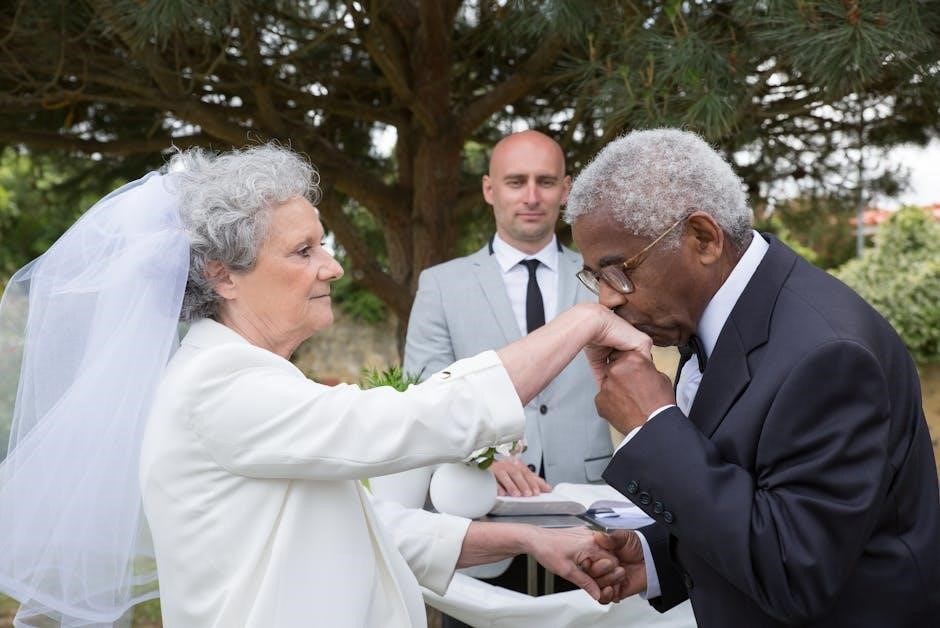
day of wedding coordinator checklist pdf
A comprehensive guide, the Day of Wedding Coordinator Checklist ensures seamless planning, covering pre-wedding, wedding day, and post-wedding tasks for a stress-free celebration․
1․1 Importance of a Day of Wedding Coordinator
A Day of Wedding Coordinator is essential for ensuring a seamless and stress-free celebration․ They oversee logistics, manage timelines, and handle unexpected issues, allowing the couple to focus on enjoying their special day․ By coordinating vendors, setup, and flow, they guarantee everything aligns with the couple’s vision․ Their expertise in problem-solving and communication is vital for maintaining order and ensuring all aspects of the wedding run smoothly․ This role is indispensable for couples seeking to savor their wedding experience without the burden of last-minute tasks and decisions․
1․2 Purpose of a Day of Wedding Coordinator Checklist
The purpose of a Day of Wedding Coordinator Checklist is to provide a structured framework for organizing and managing wedding-related tasks․ It serves as a detailed guide, ensuring no details are overlooked from pre-wedding preparations to post-wedding responsibilities․ This checklist helps break down complex tasks into manageable steps, allowing for efficient coordination of vendors, timelines, and logistics․ By following the checklist, couples and coordinators can maintain clarity and control, ensuring a seamless execution of the wedding plan․ It acts as a vital reference, reducing stress and guaranteeing a smooth, enjoyable celebration for all involved․
1․3 Benefits of Using a Day of Wedding Coordinator Checklist
Using a Day of Wedding Coordinator Checklist offers numerous benefits, including enhanced organization, reduced stress, and improved accountability․ It ensures all tasks are tracked and completed, from vendor coordination to timeline management․ The checklist provides clarity, helping couples and coordinators stay focused on priorities․ It also acts as a safeguard, preventing oversights and ensuring a seamless wedding execution․ By centralizing all responsibilities, it allows for better time management and attention to detail․ Ultimately, the checklist fosters confidence, enabling everyone involved to enjoy the wedding knowing everything is under control and perfectly planned․

Pre-Wedding Responsibilities of a Day of Wedding Coordinator
Pre-wedding duties include vendor coordination, timeline creation, budget management, and wedding style planning to ensure all aspects are in place for the big day․
2․1 Vendor Coordination and Communication
Vendor coordination is a critical pre-wedding task, ensuring all vendors are confirmed and aligned with the wedding plan․ This involves regular communication to confirm details like arrival times, setup requirements, and delivery schedules․ A wedding coordinator must create a shared timeline for vendors, outlining their roles and expectations․ Additionally, they should address any questions or concerns vendors may have․ Proper documentation, such as contracts and contact information, should be organized and easily accessible․ Clear communication ensures vendors understand their responsibilities, preventing last-minute issues and ensuring a smooth execution of the wedding day․ This step is essential for maintaining order and harmony throughout the planning process․
2․2 Timeline Creation and Management
Creating a detailed timeline is essential for a smooth wedding execution․ The coordinator outlines key moments, from vendor setups to the ceremony and reception․ This timeline is shared with vendors, the wedding party, and guests to ensure everyone is aligned․ Regular updates are made to reflect changes, ensuring all stakeholders are informed․ Proper timeline management minimizes delays and keeps the celebration flowing seamlessly․ It serves as a roadmap, guiding the entire wedding process from start to finish, and is a critical tool for maintaining order and coordination throughout the event․
2․3 Budgeting and Cost Management
Effective budgeting and cost management are crucial for a successful wedding․ The coordinator ensures all expenses align with the allocated funds, tracking every expenditure to prevent overspending․ Regular financial reviews help identify areas for cost-saving without compromising quality; Negotiating vendor contracts and managing payments are key responsibilities․ The coordinator also handles unexpected costs, ensuring the wedding stays within budget․ By maintaining detailed financial records, the coordinator provides transparency, allowing the couple to make informed decisions․ This meticulous approach guarantees that every aspect of the wedding is financially planned and executed without exceeding the set budget․
2․4 Wedding Style and Theme Coordination
Wedding style and theme coordination ensures the event reflects the couple’s vision․ The coordinator selects decor, colors, and elements that align with the chosen theme․ They collaborate with vendors to maintain consistency, from invitations to venue setup․ The checklist includes verifying floral arrangements, lighting, and furniture to match the aesthetic․ The coordinator also ensures that all wedding party attire complements the theme․ By paying attention to every detail, the coordinator creates a cohesive and visually stunning atmosphere that brings the couple’s wedding style to life, making their special day truly unforgettable and reflective of their personal taste and preferences․

Wedding Day Responsibilities of a Day of Wedding Coordinator
On the wedding day, the coordinator manages setup, vendor arrivals, and timeline execution․ They ensure seamless transitions, handle decorations, and troubleshoot issues to maintain a smooth celebration․
3․1 Setup and Decoration Management
The Day of Wedding Coordinator ensures the venue is set up according to the couple’s vision․ This includes overseeing the layout, managing vendor deliveries, and coordinating the placement of decorations․ They verify that all elements, from seating arrangements to floral displays, align with the agreed-upon design․ The coordinator also handles last-minute adjustments, ensuring the space reflects the wedding’s theme and style․ Effective communication with vendors and the wedding party is crucial to maintain a smooth setup process, allowing the celebration to begin without delays or issues․
3․2 Vendor Arrival and Setup Coordination
The Day of Wedding Coordinator manages vendor arrivals, ensuring timely setup․ They confirm delivery schedules, direct vendors to designated areas, and monitor progress․ Coordinators communicate with vendors to resolve any delays or issues promptly․ They ensure all equipment and materials are in place before the ceremony begins․ Proper coordination guarantees a smooth transition between setup and the event, allowing vendors to perform their roles efficiently․ This step is critical for maintaining the wedding timeline and delivering a flawless experience for the couple and their guests․
3․3 Ceremony Coordination and Management
The Day of Wedding Coordinator ensures the ceremony runs smoothly by managing the timeline, cueing participants, and handling any last-minute issues․ They oversee the setup of the ceremony space, coordinate the processional, and ensure all elements like music, officiants, and readings are in place․ The coordinator also verifies that the marriage license and ceremony essentials are ready․ They maintain communication with the wedding party and officiant, ensuring everyone is in position․ Troubleshooting any unexpected challenges, the coordinator guarantees a seamless and memorable ceremony experience for the couple and their guests, setting the tone for the rest of the celebration․
3․4 Photography and Videography Coordination
The Day of Wedding Coordinator ensures photographers and videographers capture all key moments by confirming shot lists and timelines․ They coordinate placement during the ceremony and reception, manage lighting and equipment setups, and facilitate family photos․ The coordinator communicates with the couple to ensure priorities are met and handles any technical issues․ They also verify that all scheduled shots are completed, maintaining the flow of events while allowing the couple and guests to enjoy the celebration without interruptions․ This coordination ensures lasting memories are beautifully preserved․

3․5 Reception Management and Flow
The Day of Wedding Coordinator ensures a seamless reception by overseeing setup, guest seating, and the timing of events like speeches, toasts, and dances․ They manage vendor deliveries, coordinate meal service, and handle any unexpected issues․ The coordinator creates a detailed reception timeline, ensuring all activities flow smoothly․ They also facilitate transitions between events, such as cake cutting or bouquet tosses, while maintaining communication with the DJ, catering staff, and other vendors․ This meticulous management allows the couple and their guests to enjoy a well-organized and memorable celebration, free from stress or delays․

3․6 Troubleshooting and Problem Solving
A Day of Wedding Coordinator excels at anticipating and resolving unexpected challenges, ensuring the wedding proceeds smoothly․ From vendor delays to weather issues, they address problems discreetly, minimizing stress for the couple․ Coordinators maintain backup plans, such as alternative indoor spaces for outdoor ceremonies, and coordinate with vendors to adapt to changes․ Their ability to think on their feet and communicate clearly helps manage last-minute adjustments, ensuring the event remains seamless and enjoyable for everyone involved․ Effective troubleshooting is a cornerstone of their role, safeguarding the couple’s vision and delivering a memorable celebration despite any unforeseen obstacles․

Post-Wedding Responsibilities of a Day of Wedding Coordinator
Post-wedding, coordinators handle vendor payments, venue cleanup, and follow-ups, ensuring all loose ends are tied․ They also assist with thank-you notes and finalizing details for a perfect conclusion․
4․1 Vendor Payments and Final Settlements
Managing vendor payments and final settlements is crucial post-wedding․ Coordinators ensure all invoices are reviewed for accuracy, payments are made on time, and any discrepancies are resolved promptly․ They also verify that deposits are refunded as per contracts and handle any outstanding balances․ This step ensures smooth closure of vendor relationships, maintaining professional connections for future events․ Proper documentation and clear communication with vendors are key to avoiding financial issues and ensuring the couple’s budget is fully accounted for․
4․2 Cleanup and Venue Management
Cleanup and venue management are essential post-wedding tasks․ Coordinators ensure the venue is left in its original condition, overseeing the removal of decorations, furniture, and trash․ They confirm vendor cleanup schedules, supervise the process, and address any damage․ Proper disposal of waste and restoration of the space are prioritized to avoid additional fees․ A final walk-through is conducted to verify everything is in order, ensuring the venue is returned to its pristine state․ This step guarantees a smooth end to the event and maintains a positive relationship with the venue and vendors․
4․3 Follow-Up with Vendors and Guests
Post-wedding, coordinators ensure proper follow-up with vendors and guests․ They confirm vendor payments, settle invoices, and gather feedback to evaluate performance․ Coordinators also thank guests for their attendance and gifts, maintaining open communication․ Additionally, they assist the couple in sending gratitude notes and addressing any post-event concerns․ This step ensures all loose ends are tied, fostering positive relationships and closure․ Effective follow-up is crucial for a seamless conclusion to the wedding celebration and future recommendations․

Tools and Resources for a Day of Wedding Coordinator
Essential tools include printable checklists, vendor questionnaires, and wedding timelines․ These resources help coordinators manage tasks, communicate effectively, and ensure a smooth execution of the wedding plan․
5․1 Printable Wedding Coordinator Checklists
Printable wedding coordinator checklists are indispensable tools for organizing tasks, ensuring no detail is overlooked․ Available as free downloadable PDFs or editable DOC files, these checklists provide a structured approach to managing pre-wedding, wedding day, and post-wedding responsibilities․ They cover vendor coordination, timelines, setup, and cleanup, offering a clear roadmap for coordinators․ By breaking down tasks into actionable steps, these checklists help reduce stress and ensure smooth execution․ Many include sections for budgeting, styling, and vendor communication, making them comprehensive resources for both professional coordinators and DIY planners․ They also serve as reliable references for delegating tasks and tracking progress efficiently․
5․2 Wedding Planning Timelines and Tools
Wedding planning timelines and tools are essential for organizing tasks, ensuring a smooth journey from engagement to the big day․ These tools provide detailed checklists broken down by month, week, and day, helping coordinators manage responsibilities efficiently․ They include Gantt charts, spreadsheets, and digital apps to track progress and assign tasks․ Many tools offer customizable templates tailored to specific wedding needs, allowing for adjustments based on the couple’s preferences․ By using these resources, coordinators can maintain clarity, meet deadlines, and ensure every detail aligns with the wedding vision, making the planning process more manageable and less overwhelming for all involved․
5․3 Vendor Questionnaires and Worksheets
Vendor questionnaires and worksheets are crucial tools for gathering essential details from vendors, ensuring seamless communication and coordination․ These documents include sections for vendor contact information, delivery timelines, setup requirements, and specific service details․ Worksheets help track vendor contracts, deposits, and final payments, while questionnaires clarify expectations and preferences․ They also cover logistics, such as load-in times, equipment needs, and dietary restrictions for catering․ By organizing vendor information in one place, these tools prevent misunderstandings and ensure all services align with the wedding plan, making the coordination process efficient and stress-free for both the couple and the wedding coordinator․
5․4 Wedding Glossary and Terminology Guide
A wedding glossary and terminology guide is an essential resource for understanding industry-specific terms and jargon․ It defines key phrases like “day-of coordinator,” “officiant,” and “vendor contracts,” ensuring clarity for everyone involved․ This guide helps coordinators and couples decipher complex terms, avoiding confusion during planning․ It also covers technical terms related to decorations, catering, and photography, providing a quick reference for unfamiliar language․ By having a glossary, coordinators can communicate effectively with vendors and ensure all details align with the couple’s vision, making the planning process smoother and more efficient․

Budgeting and Financial Management
Budgeting is crucial for managing wedding expenses effectively․ A checklist helps allocate funds to priorities, track spending, and ensure financial decisions align with the couple’s vision and limits․
6․1 Allocating Funds for Different Aspects
Allocating funds effectively ensures every wedding aspect receives proper attention․ The checklist helps prioritize spending across venues, catering, decorations, photography, attire, and entertainment, aligning with the couple’s preferences and budget․ By categorizing expenses, coordinators can manage financial resources efficiently, avoiding overspending․ This structured approach guarantees that no detail is overlooked, allowing the wedding to reflect the couple’s vision without exceeding financial limits․ Proper allocation also helps in making adjustments as needed, ensuring a balanced and memorable celebration․
6․2 Tracking Expenses and Staying Within Budget
Tracking expenses is crucial to staying within budget․ Use a detailed checklist to monitor every transaction, from deposits to final payments․ Regularly review vendor invoices and compare them to allocated funds․ Identify areas for cost-cutting without compromising quality․ Maintain open communication with vendors to avoid unexpected charges․ Consider implementing a contingency fund for unforeseen expenses․ By consistently updating financial records, you ensure transparency and accountability․ This proactive approach helps prevent overspending and guarantees that the wedding stays financially on track, allowing the couple to enjoy their celebration without stress․

Communication Strategies
Effective communication strategies ensure clear updates, regular check-ins, and prompt issue resolution․ Maintain open lines with vendors, the wedding party, and guests to avoid misunderstandings and ensure smooth execution․
7․1 Effective Communication with Vendors
Clear and consistent communication with vendors is crucial for a smooth wedding execution․ Regular updates, detailed timelines, and confirmations ensure everyone is aligned․ Use shared documents or tools for transparency and quick access to information․ Establishing a point of contact for each vendor helps prevent miscommunication․ Confirm arrival times, setup requirements, and any special instructions․ Open lines of communication allow for real-time problem-solving and ensure all deliverables meet expectations․ This proactive approach fosters trust and guarantees vendors perform at their best, contributing to a flawless wedding day․
7․2 Communication with the Wedding Party
Effective communication with the wedding party ensures everyone knows their roles and responsibilities․ Create a detailed timeline and share it with the bride, groom, bridesmaids, groomsmen, and officiant․ Confirm attire, arrival times, and key moments like speeches or processional cues․ Designate a point person for updates to avoid confusion․ Regular check-ins help manage expectations and address concerns promptly․ Open dialogue fosters collaboration and ensures a cohesive, stress-free experience for all involved, allowing the wedding party to enjoy the celebration while fulfilling their duties seamlessly․
7․3 Communication with Guests
Clear communication with guests ensures a smooth and enjoyable experience․ Provide detailed timelines, venue maps, and essential information through emails, apps, or websites․ Confirm RSVPs, dietary restrictions, and special requests․ Use signage and announcements to guide guests during the event․ Designate a point person for guest inquiries to address concerns promptly․ Share parking, shuttle, and accommodation details in advance․ Effective communication reduces confusion, allowing guests to focus on celebrating․ Regular updates and reminders keep everyone informed, ensuring a seamless and stress-free experience for all attendees․

Legal and Contractual Considerations
Review vendor contracts, ensure insurance coverage, obtain necessary permits, and manage data privacy to maintain legal compliance and protect all parties involved․
8․1 Understanding Vendor Contracts
Reviewing and understanding vendor contracts is crucial for ensuring all services are delivered as agreed․ The checklist includes verifying contract terms, payment schedules, and termination clauses․ Coordinators must ensure compliance with legal requirements and negotiate terms if necessary․ This step protects both the couple and vendors, preventing misunderstandings․ The checklist also highlights ensuring all contracts are signed and stored securely․ Proper contract management is essential for a smooth wedding execution and legal protection for all parties involved․ This ensures everyone knows their responsibilities and expectations, minimizing potential disputes during the wedding planning process․
8․2 Insurance and Liability Coverage
Ensuring adequate insurance and liability coverage is a critical step in wedding planning․ The checklist includes verifying vendor insurance policies, such as general liability and equipment insurance, to protect against unforeseen events․ Coordinators must also review the venue’s insurance requirements and ensure the couple has appropriate coverage․ This step safeguards against potential financial losses due to accidents or damages․ By addressing insurance and liability, the coordinator helps create a secure and stress-free wedding environment, ensuring all parties are protected throughout the celebration․
8․3 Permits and Licenses
Securing the necessary permits and licenses is a vital task for a wedding coordinator․ This includes obtaining alcohol permits, event permits, and any local regulations required for the venue․ Coordinators must ensure that all vendors, such as caterers and DJs, hold valid licenses to operate․ Additionally, they should verify that the venue has the proper permits for events․ Checking these details beforehand prevents legal issues and ensures a smooth celebration․ The checklist guides coordinators to confirm all permits and licenses, guaranteeing compliance with local laws and regulations for a worry-free wedding day․
8․4 Data Privacy and Management
Data privacy and management are critical for wedding coordinators to protect sensitive information․ This includes ensuring the secure handling of personal details for the couple, guests, and vendors․ Coordinators must comply with data protection regulations, such as GDPR, when collecting and storing data․ The checklist should include measures to safeguard information, like using secure databases and limiting access to authorized personnel․ Additionally, coordinators should verify that vendors adhere to data privacy standards and obtain necessary consents for data usage․ Proper data management ensures trust and avoids potential breaches, making it a key responsibility in the coordination process․